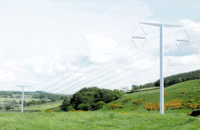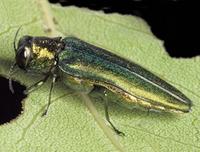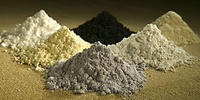-
Danish designer wins completion for new U.K. pylons

There are 88,000 pylons in the United Kingdom, carrying 400,000 volts of electricity over thousands of miles across the country; the design of the pylons has barely changed in eighty years – and a winner has just been announced in the competition for a new pylon design
-
-
Little progress despite $3.4 billion spent on food safety programs

In the past decade the U.S. government has gone to great lengths to secure the nation’s food supply against terrorists, but more than $3.4 billion later it has little to show for its efforts; despite all the government spending, key food safety programs and counter-terror policies have been bogged down by a murky, convoluted bureaucratic process
-
-
Iranian airline sanctioned for ties to terrorism
On Wednesday the U.S. Treasury Department imposed sanctions on sanctioned Mahan Air, an Iranian airline, for supporting terrorism
-
-
Sony hit by hackers again, 93,000 accounts compromised
Once again Sony has been the victim of a major cyberattack. This time as many as 93,000 accounts have been compromised from Sony Entertainment Network, PlayStation Network, and Sony Online Entertainment
-
-
UN warns record food prices to continue
Food prices are projected to continue skyrocketing and remain volatile leaving poor countries and consumers exposed to food insecurity, according to a recently released UN report
-
-
Michigan to launch cyber command center and defense teams
To help boost the state’s economy and its role in securing the nation’s data networks, Michigan recently announced that it plans to launch a cyber command center and cyber defense response teams
-
-
Public-private partnership in homeland security
The Homeland Security and Defense Business Council says that job of securing the U.S. homeland is an extensive and daunting mission that cannot be accomplished by government alone; it requires that the United States, collectively, become a resilient nation, with the capabilities needed to prepare for, protect against, respond to, recover from, and mitigate against all threats
-
-
Focus on terrorism allowed foreign pests to slip into U.S.

Following the 9/11 attacks the U.S. government assigned hundreds of agricultural scientists responsible for stopping invasive species at the border to anti-terrorism duties; the result has been that dozens of foreign insects and plant diseases managed to slip undetected into the United States
-
-
Doyenz, Lifeboat Distribution in distribution agreement
Lifeboat Distribution, a software distributor for disaster recovery, will distribute Doyenz’s cloud-based recovery services to thousands of its reseller partners across North America
-
-
Blackberry service disruption spreads across North America
Research in Motion announced earlier today that the 3-day disruption of the company’s e-mail services has now spread across North America; it is the worst such disruption of service in two years; analysts say it is a major blow to the already-struggling company; not only individuals, but also private companies and government agencies may now reconsider their reliance on Blackberrys as their preferred mode of communication
-
-
TraceSpan Communications shows new interception device
DOCSIS Phantom intercepts target communications directly from the line and collects a hundred percent of the information in both directions, to and from the ISP or communications provider; the device allows interception of all data, including peer-to-peer communication, even when it does not pass through the ISP server
-
-
Rising political, economic tensions over critical minerals

The clean energy economy of the future hinges on many things, chief among them the availability of the scores of rare Earth minerals and other elements used to make everything from photovoltaic panels and cellphone displays to the permanent magnets in cutting edge new wind generators; trouble is, China currently controls about 97 percent of the mining and production of the minerals, and it is using that control to give Chinese companies an advantage and for political pressure on other countries
-
-
Global Security Challenge grand final 24-25 October
Global Security Challenge grand final will be held in London 24-25 October; six start-ups and six SMEs will compete for a prize fund of $500,000
-
-
Voice-recognition market to reach $58.4 billion in 2015
New report says the voice recognition technologies market will grow at a compound annual growth rate (CAGR) of 8.8 percent between 2010 and 2015; the total market is valued at an estimated $38.4 billion in 2010 and is expected to reach $58.4 billion in 2015; this growth will spur additional growth in two sub-markets: voice recognition software technologies and text-to-speech software
-
-
M2SYS's Hybrid Biometric Platform offers flexibility
The biometric recognition market lacks enterprise-ready, customizable, device-independent systems that allow organizations of any size to avoid being limited to one biometric modality or a single biometric device; Frost & Sullivan says M2SYS’s Hybrid Biometric Platform addresses this problem
-
More headlines
The long view
Factories First: Winning the Drone War Before It Starts
Wars are won by factories before they are won on the battlefield,Martin C. Feldmann writes, noting that the United States lacks the manufacturing depth for the coming drone age. Rectifying this situation “will take far more than procurement tweaks,” Feldmann writes. “It demands a national-level, wartime-scale industrial mobilization.”
Trump Is Fast-Tracking New Coal Mines — Even When They Don’t Make Economic Sense
In Appalachian Tennessee, mines shut down and couldn’t pay their debts. Now a new one is opening under the guise of an “energy emergency.”
Smaller Nuclear Reactors Spark Renewed Interest in a Once-Shunned Energy Source
In the past two years, half the states have taken action to promote nuclear power, from creating nuclear task forces to integrating nuclear into long-term energy plans.
